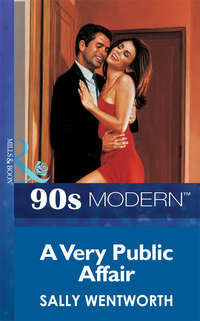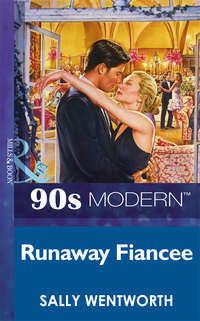
Полная версия
Christmas Nights

Table of Contents
Cover Page
Excerpt
About the Author
Title Page
CHAPTER ONE
CHAPTER TWO
CHAPTER THREE
CHAPTER FOUR
CHAPTER FIVE
CHAPTER SIX
CHAPTER SEVEN
CHAPTER EIGHT
Copyright
“Will you kiss me?”
Paris lifted a hand to touch his face gently. Will froze, then raised a cynical eyebrow. “For old times’ sake?”
“No.” She shook her head. “For now. For the me I am now.”
For a long moment Will didn’t move and she thought that he was going to deny her, but his grip tightened on her arm and he drew her slowly toward him, his eyes holding hers. He lowered his head to hers, touched her lips with his mouth. For an instant it was as if time had stood still and he was kissing her for the very first time all over again.
SALLY WENTWORTH was born and raised in Hertfordshire, England, where she still lives, and started writing after attending an evening class course. She is married and has one son. There is always a novel on the bedside table, but she also does craftwork, plays bridge, and is the president of a National Trust group. They go to the ballet and theater regularly and to open-air concerts in the summer. Sometimes she doesn’t know how she finds the time to write!
Christmas Nights
Sally Wentworth

www.millsandboon.co.uk
CHAPTER ONE
PARIS had been home for less than an hour when the police came. The flat was cold and unwelcoming. When she’d left to go to Budapest six weeks ago the weather had been mild and autumnal and it hadn’t seemed worthwhile leaving the heating on. Now, a week before Christmas, it was freezing outside and the flat was not much warmer.
She’d turned the heating up as high as it would go, drawn the curtains across the frosted windows, fixed herself a drink, and kicked off her shoes as she sat on the settee and began to go through the piles of letters, Christmas cards and junk mail that she had found on the doormat.
When the buzzer sounded Paris frowned, of half a mind to ignore it, but it rang imperatively for a second time, and with a sigh she went over to the entry phone. The faces of two men she didn’t know looked at her from the screen.
‘Yes?’
‘Miss Paris Reid?’
‘Yes.’
‘We’re policemen, Miss Reid.’ The nearest man held up an identity card. ‘May we talk to you, please?’
‘Has there been an accident?’ Paris asked, immediately fearful for her parents.
‘No, it’s nothing like that, but we need to talk to you urgently.’
‘You’d better come up, then.’
She waited by the open door for the lift to arrive at her floor. The flat, in the northern suburbs of London, was her own, the mortgage paid for out of her quite considerable earnings. There was only one bedroom, but that suited Paris fine; she had no intention of ever sharing it with a female flatmate—or anyone else, if it came to that.
The policemen had said that there hadn’t been an accident but Paris was still uneasy as she greeted them and led the way into her sitting-room. ‘It isn’t one of my parents?’ she asked anxiously.
‘No, Miss Reid. It’s about Noel Ramsay.’
For a moment it didn’t mean anything, then she grew still. ‘Noel Ramsay?’ she repeated, to give herself time.
‘Yes. You must remember that you were on the jury when he was tried for murder, nearly four years ago now.’
‘Yes, of course.’ She dredged her memory. ‘He escaped, didn’t he? I seem to remember reading about it in the papers some months ago.’
‘That’s right.’ The policeman who’d introduced himself as a detective inspector gave her a pleased smile, as if she were a bright pupil in a classroom.
‘But why on earth should you come to me about him? You did catch him again, didn’t you?’
‘No, I’m afraid we didn’t,’ the inspector admitted ruefully. He paused, then said, ‘I don’t want to alarm you, but you may remember that at the trial Ramsay swore to be revenged on everyone who put him away.’
For a brief, horrible moment the vision of Ramsay’s face, twisted by hate, shouting threats and abuse as he was dragged away, came sharply back into Paris’s mind. ‘Yes, I remember,’ she said tightly.
‘Yes. Well—I’m afraid it’s beginning to look as if he’s carrying out his threat.’
‘What do you mean?’
‘Haven’t you been reading the papers lately? The barrister who prosecuted Ramsay was killed by a hit-andrun driver about three months ago, and then one of the policemen who arrested him was very badly injured when the brakes on his car failed—a newish car that had always been well maintained.’
‘Couldn’t those things have been coincidental?’
‘Possibly.’ The inspector shrugged. ‘But a month ago one of the prosecution witnesses just disappeared, and then a member of the jury was found dead in suspicious circumstances. Two incidents could possibly be coincidence, but hardly four. And so we—’ He broke off. ‘Are you all right, Miss Reid?’
Every last vestige of colour had fled from Paris’s face and her throat didn’t seem to work. Her whole being felt suspended in time, too frozen to breathe, but by a tremendous effort of will-power she somehow forced herself to say, ‘Which—which member of the jury?’
‘A Mrs Sheila Rayner. She was the foreman of the jury, if you remember,’ he answered, looking at her curiously.
‘Yes, of course.’ Paris’s heart started to beat again, relief to flow through her veins and bring the colour back to her cheeks. ‘That—that’s terrible. I’m so sorry.’ Getting to her feet, she turned away. ‘Would you like a drink?’ Both men refused but she topped up her own glass and took a long swallow before she faced them again. ‘I didn’t know any of this. I’ve been away, in Hungary, and it wasn’t easy to get English papers.’
‘We know,’ the inspector said with a small smile. ‘We’ve been calling here hoping to find you for a week or so.’
‘To warn me?’
‘Partly that, but also because we’re taking everyone who was involved in the trial to a place of safety. We don’t want anyone else being hurt while we catch Ramsay again.’
Paris’s eyes widened. ‘You’re taking everyone involved? Even the jurors?’
‘Everyone,’ he confirmed. ‘The judge, barristers, witnesses, jurors, even the clerk of the court.’
‘But surely the jurors’ names were never stated in court; how could Ramsay possibly know who we are?’
A grim look came into the policeman’s eyes. ‘Unfortunately the records of the case have disappeared from the archives; we can only assume that Ramsay or an accomplice must have taken them. And if he has—’ he shrugged expressively ‘—then Ramsay knows the names and addresses of everyone connected with the trial.’
‘Don’t you have any leads?’
‘We’re pursuing the matter with the utmost urgency, of course,’ he told her, in what was plainly a stock police phrase for saying that they didn’t have a clue. ‘But he’s already got one of you jurors and I’m not taking any chances. So if you’ll pack a suitcase we’ll get you to a place of safety tonight.’
Paris stared at him unseeingly, her mind whirling as she tried to take in the implications, decide what to do. ‘Are all the people being taken to the same place or are you splitting them up?’
‘No, you’ll all be together. It makes it easier to protect you that way.’
That, of course, made her mind up fast. ‘I’m sorry,’ she said firmly, ‘but I can’t possibly go. Please don’t worry about me. I shall be quite safe here and I—’
‘You will not be safe.’
He spoke sharply but Paris didn’t hesitate before saying, ‘But of course I will. My old address may be on the records but I’ve moved three times since then. And I’m ex-directory. No one could possibly trace me.’
‘We did,’ the second policeman, a sergeant, pointed out with some irony.
‘Yes, but you’re the police; with all the resources you have you’re supposed to find people.’
‘You’re on the electoral roll for this district. Anyone can walk into a library, look at it, and find your address. With a Christian name like yours it was simple.’
Paris bit her lip, not for the first time blaming her parents for giving her such a distinctive name. But she persisted, saying, ‘I’m sorry, but I refuse to go. You can’t make me.’
‘No, we can’t,’ the inspector agreed. ‘Is it because you’ve made plans for Christmas, or are you having guests to stay?’
‘No,’ she admitted. ‘But I’ve already been away for over a month; there’s loads I have to catch up on, at work as well as here.’
‘I’ve already spoken to your employers and they quite understand the situation. They told me to tell you that they don’t expect to see you again until Ramsay is caught.’
She gasped, amazed that the police had gone to those lengths before they’d even talked to her. ‘I’ve been invited to several parties,’ she said doggedly. ‘If I didn’t go to them my friends would worry and—’
‘In that case you can phone and tell them you’ve changed your plans. Tell them you’ve had an unexpected invitation and that you’ll be going away for Christmas instead.’
‘But…’ She sought for a convincing argument. ‘But it could take weeks, months even, before you catch him. I can’t possibly be away for that length of time.’
‘We don’t anticipate it taking anything like that long, miss.’
‘Are you saying that you’re close to catching Ramsay?’
‘I don’t want to commit myself, but just take my word for it that it won’t be for very long.’
Paris didn’t believe him but there was no point in saying so. Finishing her drink, she shoved her hands into the pockets of her jacket so that the men couldn’t see the way they tightened into fists. ‘Look,’ she began, then stopped, not wanting to say this. But there was no help for it—the policemen were so very determined. ‘There are reasons—very personal reasons—why I can’t possibly go with you.’
‘What reasons?’
‘They needn’t concern you,’ she snapped. ‘But I am not going.’
The middle-aged inspector, who looked as if he wouldn’t be sorry when retirement came along, gave her a tight-lipped look. ‘Very well, Miss Reid. In that case you leave me no choice.’
‘What do you mean?’ Paris asked warily.
‘If you won’t let us take you to a place of safety, then I shall have to give you police protection.’
To Paris that didn’t sound at all bad but his voice had had a threatening note in it, so she said, ‘Which means?’
‘A woman police officer will have to be with you at all times, day and night, and there will also be a male constable at your door. We will turn this place into a fortress,’ he threatened determinedly.
‘But my neighbours would hate that—and besides, there isn’t enough room here for two people to live,’ Paris protested.
‘No help for it, I’m afraid—if you’re going to be obstinate.’
He had deliberately made the conditions impossible to accept, she realised, and burst out on a desperate note, ‘Don’t people’s personal feelings matter to you?’
‘Not when their lives are in danger, no. I can’t let them matter,’ the inspector answered emphatically.
She was cornered, and hesitated, wondering whether to throw herself on his mercy and explain just why it was impossible for her to go. But a glance at the inspector’s set face, wearily patient but determined, made her decide it would be no use. He was too stolid to understand the trauma of seeing again an ex-lover, a man who had, quite literally, thrown her out of his life.
Clenching her fists till it hurt, Paris said, ‘Are the other people already at this safe place?’
‘Yes.’
‘All of them? All the jurors?’
His assessing eyes met hers. ‘All except the lady who was murdered, yes.’
Murdered. Such a dreadful word. It brought home to Paris for the first time the danger she was in. But she still said, ‘Please, I can’t go with—with all the others. I’ll go somewhere else, if you like, but not with them.’
He nodded, in no way surprised. ‘I see.’
She caught her breath, realising that there had been no need for any soul-searching; he already knew it all. ‘Yes, very likely you do,’ Paris said bitterly.
The inspector glanced at his colleague, hesitated, then said with a degree of sympathy that she hadn’t expected, and which confirmed his knowledge, ‘It probably won’t be for long, perhaps just a week or so, and then you’ll be able to come home. There will be a lot of people there, enough so you won’t be thrown together with anyone you don’t want to be with. You’ll have your own room and be as private as you like. But I’m sorry, I can’t arrange for somewhere else for you at this short notice. If it goes on for longer I might be able to arrange for you to go somewhere else after Christmas, though.’
When it would be a complete waste of time, Paris thought despondently. Her nightmare of the last three years had been that she might chance to meet the man she’d been so in love with, have to face him again and see the contempt in his eyes. Now it looked as if she was not only going to see him, but would have to spend an indefinite period in his proximity.
With a sigh, Paris said dully, ‘If you’ll promise to find me somewhere else as soon as possible, then, all right, I’ll come. Where are we going?’
‘I’m afraid we’re not allowed to tell you that.’
She gave him a look that spoke volumes. ‘I am going to wash my hair,’ she said forcefully. ‘And then I’m going to have something to eat, unpack, and make several phone calls. Then I’ll get ready to go. Is that all right by you?’ Her hands were on her hips and the last sentence was said in a dangerous tone that dared him to argue.
The inspector, having got his own way by forceful coercion, could have been magnanimous, but all he said was, ‘So long as you can do all that within the next two hours, yes.’
They took her in a car and drove for quite some way, but then, to Paris’s surprise, the car stopped and they hurried her into a station and onto a train where she was to share a sleeping compartment with a policewoman. The blinds were pulled down across the windows on both sides and she couldn’t see out. The door was locked and the light turned low.
Paris’s thoughts were far too full for her to want to sit and chat with the policewoman, so she said that she was tired, took off her shoes and coat and climbed into the upper bunk, firmly closing her eyes.
Her heart was filled with a dread so deep that it was almost like a physical fear. How would she bear it if Will openly showed his hatred of her? Even now, after so long, it was still sometimes hard to understand how it had all gone so wrong—so horribly, humiliatingly wrong. Maybe it was because of the circumstances in which they’d met: at a murder trial, of all things. But there had been such radiant happiness, too, at the beginning…
The train journeyed on through the night, swaying, clanking along the rails, the rushing air loud outside, and Paris’s mind went back to the very beginning, when she had been sitting at breakfast with Emma, one morning in late spring.
‘Jury service!’ Paris gazed at the letter in her hand in consternation. ‘But I can’t possibly do it. I don’t have the time.’
‘When are you supposed to go?’ Emma, her flatmate, reached over and took the letter from her. ‘The seventh. That’s only three weeks away. And at the Old Bailey, too; that’s where they have the longest cases, isn’t it?’
Paris’s frown deepened into gloom. ‘I know—and I’m supposed to be going to the conference in Brussels that week.’
‘Perhaps you can get out of it,’ Emma suggested languidly as she handed the letter back. ‘Tell them you’re going on holiday or something.’
Paris hesitated. ‘Wouldn’t that be against the law? Couldn’t you be fined or something if you were found out?’
Emma gave an astonished laugh. ‘For heaven’s sake! Who’s going to find out? People do it all the time.’
‘Well, I can try, I suppose,’ Paris said, still rather dubious, but she reflected that Emma, who was more than ten years older and worked for the same company, usually knew what she was talking about.
Later that morning, as soon as she arrived at her office at the cable network company for which she worked as a sales representative, Paris called the clerk of the court’s office and asked to be released from doing the jury service. He asked for proof that she had booked a holiday, and when she lamely admitted that she had none he refused point-blank to let her off.
‘Isn’t it possible to postpone it indefinitely?’ she begged.
‘No, madam, it is not,’ the man said shortly.
So there was no getting out of it. Paris had to go and see her boss, who arranged for Emma to attend the Brussels conference in her place. Paris was furious at her bad luck; she’d had this job for less than a year since leaving university and was putting everything she had into it. Representing the company at conferences, going abroad to promote their network strategies, being always available to visit potential clients constituted a big part of the job.
Paris had passed the training course with flying colours, was one of the brightest young reps, and knew that a good career lay ahead of her. Which she certainly intended to achieve. She was ambitious and wanted to get to the top just as soon as she possibly could. But there were always others with the same ambitions, the same aims. Having to sit through some criminal case for weeks on end, or even months, she thought with a groan, wouldn’t do her career any good at all.
Angrily reluctant to serve as she was, Paris had to admit to a feeling of awe when she arrived at the Central Criminal Court—the Old Bailey as the building was commonly known—in the heart of the City of London. The courtroom was so old, the polished wooden benches and the judge’s throne-like seat high on a dais so reminiscent of all the trial films she’d ever seen that she couldn’t help but feel the solemnity and power of the place. Looking at the dock, she thought of all the-people who had been tried there—murderers, rapists; she gave a shiver, her anger momentarily chastened.
Her fellow jurors seemed to have similar feelings. Earlier, they’d had to stand one by one and give their name and age and take the oath. Paris hated that, considering her age to be her own business. When it was her turn, her voice had a strong note of defiance as she said, ‘Paris Reid. I’m twenty-two.’
A couple of the younger barristers smiled, as did one of the male jurors, she noticed. He was sitting on the end of the row and hadn’t yet been called—a dark-haired man with a strong jaw and clean-cut features adding up to a good-looking face. He was the last to take the oath and did so in a firm voice.
‘William Alexander Brydon. Twenty-nine. I swear by Almighty God that I will faithfully try the defendant and true verdict give according to the evidence.’
The oath, which Paris had hardly taken in, sounded very impressive when spoken in his deep, attractive tone, making her realise again the solemnity of the court. The judge must have been impressed too, because when he asked them to choose a foreman from amongst themselves he looked straight at William Brydon. But before the latter could speak a middle-aged woman stood up purposefully and volunteered herself, which pleased Paris; she was all for women sticking up for their rights. The judge merely raised his eyebrows slightly.
The case they were to hear was one of aggravated assault and murder. The prisoner, a man in his early forties named Noel Ramsay, was accused of beating up several people, one of whom—a man who had tried to steal Ramsay’s girlfriend—had later died. The man in the dock was smartly dressed, had a boyishly good-looking face and a figure that was only just beginning to run to fat.
Paris found it difficult to imagine him hurting anyone. Perhaps it was the engaging, crinkly-eyed smile that he flashed at them all, the look of surprised innocence in his eyes, as if he still couldn’t believe that he was there, that it was all happening to him.
That first morning it seemed to be all technical stuff. They broke for lunch, most of which time Paris spent on the phone, first to her office, trying to keep up with everything that was happening, and then to customers. She had just a few minutes left in which to grab a couple of bites from a sandwich before it was time to go back into the courtroom.
The jurors automatically sat in the same places as before. That afternoon they listened to a pathologist and had to look at photographs that made Paris’s stomach turn over. If she hadn’t really been aware of the seriousness of the case before, she certainly was after that.
At the end of the day. Paris rushed out of the building and drove to her office in a town to the north of London. There she spent three hours at her desk before driving home to a scratch supper and bed. She was young and healthy and could keep up the hectic pace for a while, but during the second week she began to feel the pressure. To add to everything the unpredictable English weather decided to have an early heatwave.
Paris overslept one morning and arrived just as the jurors were filing into their places. She gave a hasty apology to the clerk of the court, a man moved up for her, and she slipped in at the end of the row. Because she’d been so busy she had hardly talked to her fellow jurors and it took her a minute before she remembered that her neighbour’s name was William Brydon. He gave her an amused smile which she met with a small shrug.
The evidence that morning was again technical. There was no air-conditioning in the court and it was very hot. The barristers were sweltering under their white wigs and several members of the jury took off their jackets.
Paris tried to concentrate but found her eyes drooping. She straightened in her seat, licked dry lips and wished she could have a drink. The police witness droned onsomething about makes of cars that the accused had owned and sold. William Brydon’s shoulder was invitingly close. Paris’s head rested gently on it and she fell asleep.
‘She seems to have fainted, my lord.’
The words, spoken loudly close by in a man’s voice, woke her.
Paris blinked, came to guiltily, and would have jerked upright, but William Brydon was gently slapping at her cheeks, leaning over her so that she was hidden from everyone else. ‘You fainted,’ he murmured so that only she could hear. ‘You don’t want them to restart the whole trial, do you?’ he added insistently.
Realising what he was doing, Paris gratefully fell in with the act. She gave a realistic moan and let him put her head down between her knees—none too gently, she noticed. The clerk and the woman foreman of the jury came over, the latter with some smelling salts which she insisted on holding under Paris’s nose, making her sneeze.
‘Perhaps if she could have some fresh air?’ William Brydon suggested.
‘We’ll adjourn the court for lunch,’ the judge decided.
Putting a strong arm round her, her neighbour escorted her out of the court, down the long corridor and out into the street. Not far away there was a small green oasis of trees surrounding the remains of a ruined church. When they reached its screening shade he immediately withdrew his arm. ‘A heavy date last night?’ he asked sardonically.
‘No, I was working,’ she retorted indignantly.
‘After a day here? Are you self-employed or something?’











